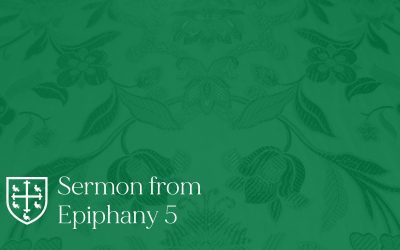Proper 16 Year C 8/24/2025
Jeremiah 1:4-10; Psalm 71:1-6; Hebrews 12:18-29; Luke 13:10-17
Rev. Mark A. Lafler
Our Old Testament reading today…
The beginning of the book of Jeremiah…
Gives an account of the calling of the prophet Jeremiah.
One of the greatest prophets of the Bible and Jewish history.
Jeremiah was called at a young age…
To be God’s voice during a time of difficulty and impending doom.
Judea would go through tumultuous times during the life of Jeremiah.
Nevertheless, the prophet was God’s chosen vessel to speak during these hard times.
And it’s the first part of this reading from the first chapter of Jeremiah that I want to highlight this morning.
It says:
The word of the Lord came to me saying,
“Before I formed you in the womb I knew you,
and before you were born I consecrated you;
I appointed you a prophet to the nations.”
In God’s call to Jeremiah, he brings the assurance that this has been God’s plan even before Jeremiah was born or conceived…
It was God who predestined Jeremiah to be a prophet to the nations.
Today, I want to talk about this doctrine of the church…
Predestination.
Predestination is the sovereign determination and foreknowledge of God.
That God knows all things.
Holds all things.
That in God’s providence he is in His superintending activity over human actions and human history, bringing creation to its divinely determined goal.[1]
Although predestination can certainly be taken out of the context as it is given in scripture…
And we can see that with extreme forms of what is called Calvinism.
Though we would also be wise not to dismiss the doctrine,
simply because of how it has been abused in some circles.
Today I offer you a Biblical view of predestination.
It is a Biblical doctrine.
And it is through and through in the scriptures.
And I want to read some of the key verses related to this understanding.
We saw how it was nuanced in the opening chapter of Jeremiah.
It also shows up in our Psalm that is appointed for today.
In Psalm 71 the author writes:
For you are my hope, O Lord God,
my confidence since I was young.
I have been sustained by you ever since I was born;
from my mother’s womb you have been my strength;
my praise shall be always of you.
Likewise, in another Psalm we hear similar yet more detailed verses regarding God’s work in a persons life, even before birth.
In the assuring words of Psalm 139 it says:
For you created my inmost being;
you knit me together in my mother’s womb.
I praise you because I am fearfully and wonderfully made;
your works are wonderful,
I know that full well.
My frame was not hidden from you
when I was made in the secret place,
when I was woven together in the depths of the earth.
Your eyes saw my unformed body;
all the days ordained for me were written in your book
before one of them came to be.
How precious to me are your thoughts, God!
How vast is the sum of them!
Were I to count them,
they would outnumber the grains of sand—
when I awake, I am still with you.
In the New Testament we have plenty of examples of the doctrine of predestination.
In Romans 8, one of the most prolific chapters of the New Testament, St. Paul wrote:
For those God foreknew he also predestined to be conformed to the image of his Son, that he might be the firstborn among many brothers and sisters.
And those he predestined, he also called; those he called,
he also justified; those he justified, he also glorified.
Again St. Paul in the first chapter of Ephesians…
One of the most encouraging chapters in the scriptures,
He wrote:
In him we were also chosen,
having been predestined according to the plan of him who works out everything in conformity with the purpose of his will, in order that we, who were the first to put our hope in Christ, might be for the praise of his glory.
And you also were included in Christ when you heard the message of truth, the gospel of your salvation.
When you believed, you were marked in him with a seal,
the promised Holy Spirit, who is a deposit guaranteeing our inheritance until the redemption of those who are God’s possession—to the praise of his glory.
St. Peter in his first letter writes:
…you are a chosen people, a royal priesthood, a holy nation, God’s special possession, that you may declare the praises of him who called you out of darkness into his wonderful light.
(1 Peter 2.9)
And finally, in the words of our Lord Jesus,
In the Gospel of John, he says:
I no longer call you servants, because a servant does not know his master’s business. Instead, I have called you friends, for everything that I learned from my Father I have made known to you. You did not choose me, but I chose you and appointed you so that you might go and bear fruit—fruit that will last—and so that whatever you ask in my name the Father will give you.
(John 15.15-16)
And the thing that all of these scriptures have in common is that while they tell of God’s foreknowledge…
They tell of our predestination…
They tell of how God chose us before we had the ability to think and reason…
The context of all of these occasions…
Is to give assurance and comfort.
And that is the purpose of the doctrine of Predestination – to reassure us and to reorientate our life to Jesus.
These verses give us comfort and hope…
Strength and assurance.
They are not given so that we might puzzle out the relation of time to eternity…
Or of human choices to divine.[2]
Many of those things are hidden in the mystery of God.
The doctrine of predestination is there for the purpose of assurance.
For the purpose of comfort.
The English Reformer, Thomas Cranmer originally crafted the 39 Articles as a point of doctrine for our church.
These 39 articles are found in our Book of Common Prayer and each article covers a topic or idea that was important during the reformation…
As the Church of England separated itself from the Roman Catholic Church in the 16th century.
One of these articles, number 17 concerns predestination and election.
And I will summarize it for you here…
Although feel free to look it up later…
It can be found in the Book of Common Prayer on page 871.
So, Article XVII. Of Predestination and Election, says:
Predestination to Life is the everlasting purpose of God,
whereby (before the foundations of the world were laid) he hath constantly decreed by his counsel secret to us,
to deliver from curse and damnation those whom he hath chosen in Christ out of mankind,
and to bring them by Christ to everlasting salvation,
as vessels made to honour.
It goes on to give the benefit of our election and predestination in Christ Jesus:
they through Grace obey the calling:
they be justified freely:
they be made sons of God by adoption:
they be made like the image of his only-begotten Son Jesus Christ:
they walk religiously in good works, and at length, by God’s mercy,
they attain to everlasting felicity.
And then the article gives this wonderful overview:
As the godly consideration of Predestination, and our Election in Christ, is full of sweet, pleasant, and unspeakable comfort to godly persons…
In all the 39 articles there are only two places that Cranmer used the word comfort.
In Article XI about Justification…
Where he writes: …we are justified by Faith only, is a most wholesome Doctrine, and very full of comfort…
So the doctrine that we are saved by faith and not works is a comfort.
And here in Article XVII about Predestination…
That the doctrine of Predestination is full of sweet, pleasant, and unspeakable comfort.
Just as in the context of the scriptures we heard today are for the purpose of assurance and comfort.
So in all of this I hope you come away with two things today.
First, a better understanding of the doctrine of Predestination.
It’s proper Biblical use and context and as it is used in our tradition.
Second, that you today sense and feel the comfort of God.
That through Jesus Christ…
Through the power of the cross and glory of the resurrection…
That by grace through faith…
We have been chosen by God to be his people.
And because he chose you…
Because he foreknew you before you were ever conceived…
Because he predestined you to be a child of God…
Know that he will never leave you…
He will never give up on you.
You are his.
And he loves you more than you can even imagine.
Which is why when St. Paul talks about this doctrine in Romans (8.38-39), he then brings home the great assurance of our Lord.
He writes:
For I am convinced that neither death nor life,
neither angels nor demons, neither the present nor the future,
nor any powers, neither height nor depth,
nor anything else in all creation,
will be able to separate us from the love of God that is in Christ Jesus our Lord.
For those who believe in Jesus… may we take great comfort that he has chosen us and will not give up on us.
We are his and we will be with him forever.
Amen.
[1] Grenz, Guretzki, and Fee Nordling, Pocket Dictionary of Theological Terms (Downers Grove: IVP, 1999), 94 and 97.
[2] Derek Kidner, The Message of Jeremiah, TBST (Downers Grove: IVP, 1987), 25.




